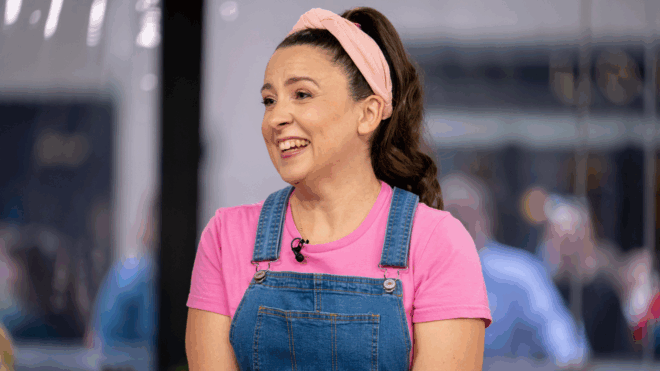
In this article
As the days get shorter and colder, and we retreat indoors, protecting your family members from COVID is more important than ever. So just as we did for Passover and Rosh Hashanah, our Hanukkah festivities this year will need to be shifted to socially distant celebrations.
“Covid has affected and challenged us in ways we could never have imagined,” Rabbi Mendy Gurkov told Mom.com. “But we must not despair. We are currently faced with darkness and we must be strong and shine brighter than ever before.”
When is Hanukkah?

Hanukkah is celebrated for eight nights beginning the 25th of the Hebrew month of Kislev. This year, that means that the first night falls on Thursday, December 10 and ends the evening of Friday, December 18.
The festival commemorates the victory of Jewish fighters against a Syrian occupiers in 168 BCE, and the miracle that occurred when they reclaimed their temple in Jerusalem. As they relit the temple’s eternal flame, they noted they only had enough oil to last for one day. A messenger was sent to get more oil, a round trip that would take eight days.
The miracle of Hanukkah was that the flame lit in the temple at the beginning of the trip lasted until the messenger returned with the oil.
Traditions of Hanukkah and what they mean
The eight nights of Hanukkah are celebrated by Jewish families all over the world by lighting a nine-branched candelabra called a hanukkiah (eight branches for each nights of the festival, plus one branch for the shamash, or “servant” candle that lights the others).
The oil used to rededicate the temple in Jerusalem is symbolized by cooking fried foods. Potato pancakes (latkes), jelly donuts (sufganiyot), and vegetable fritters are just a few of the kinds of fried Hanukkah foods enjoyed throughout the Jewish diaspora.
It is also traditional to give coins (gelt) to the children of the family (either real money or coins made of chocolate), which they may use (or lose) when they spin the dreidel. The four-sided top displays Hebrew letters that stand for the phrase "Nes Gadol Haya Sham," which means "a great miracle happened there."
Naama Mor spoke to Mom.com from Israel, where she pointed out that the Hebrew letters in her country signify a phrase that means “A great miracle happened here.”
The dreidel game is quite ancient, Naama pointed out — but easy enough for children to play.“Each player begins the game with an equal number of coins, or food items like M&M's, popcorn, or some Cheerios). At the beginning of each round, everyone puts one piece into the center ("pot"), and takes turns spinning the dreidel. Depending on which side is facing up when it stops spinning, the player whose turn it is gives or takes game pieces from the pot,” she said.
Americans may be surprised to learn that giving gifts on Hanukkah is NOT an old Jewish tradition, but a custom that U.S. families adopted in the early 20th century.
How to celebrate Hanukkah while social distancing

The easiest way to ensure that your Hanukkah is safe would be to confine your celebration to your immediate household — but that would leave out grandparents, aunts and uncles, cousins, and friends.
You can connect farflung members of your family for each night's lighting of the candles using a platform like Facetime or Zoom. Create a schedule that will allow each household to take turns from one night to the next, leading the prayer and the candle lighting. If you have family members in other time zones, you may have to accommodate lighting your menorah at odd times (sunset in New York City is around 3:00 PM in Los Angeles).
Shifra Klein is the editor-in-chief & co-founder of Fleishigs magazine, dedicated to modern kosher cuisine, and she shared some ideas with Mom.com for making Hanukkah 2020 special.
“Creating a virtual Hannukah Zoom or Skype party that’s themed around a favorite holiday activity or food offers a fun and engaging way for friends and family to celebrate together and keep Hannukah traditions alive, even if you’re physically apart,” said the mother of three from Long Island, New York.
“There is a lot you can do in your own home with your immediate family to make each night of Hanukkah special and memorable," Shifra said. "For instance, creating a unique theme or different activity for each of the eight nights: one night could be game night, and on another night you could create a latke bar with all sorts of different latkes. One night could be 'Hannukah Around the World', where you serve traditional dishes with a global twist."
Keeping the traditions of Hanukkah: Ideas for celebrating during the pandemic

Shifra offered some other activities families can engage in over Zoom:
- Doughnut decorating contest (make it easy by using store-bought doughnuts)
- ”Chopped”-style latke cooking competition.
- Play Dreidel via Zoom (use Cash App or Venmo to send prize money to the winner_)
Other things to do together, while apart:
Cooking together
Preparing the Hanukkah meal together — and sharing the results with your extended family virtually — would be a great activity to lessen the distance. Award-winning cookbook author Joan Nathan specializes in popularizing dishes from throughout the Jewish diaspora. Explore her holiday recipes here.
Arts and crafts
Naama suggested putting the kids to work creating Hanukkah greeting cards. She’s put together some cute printables with sayings like “I Like You a Latke.”
Above all, this is a time to remember to be kind to one another, said Rabbi Gurkov.
“We can use this challenging time as an opportunity to grow, as a springboard to move forward. Be there for our loved ones even more. Be the helping hand, the listening heart, the loving neighbor," he said. "And we will come out of this, hopefully very soon, having reached greater heights of goodness and kindness, like the oil in the menorah, which always rises to the top.
"Together, with each good deed, we will make this world an even better place for all.”




